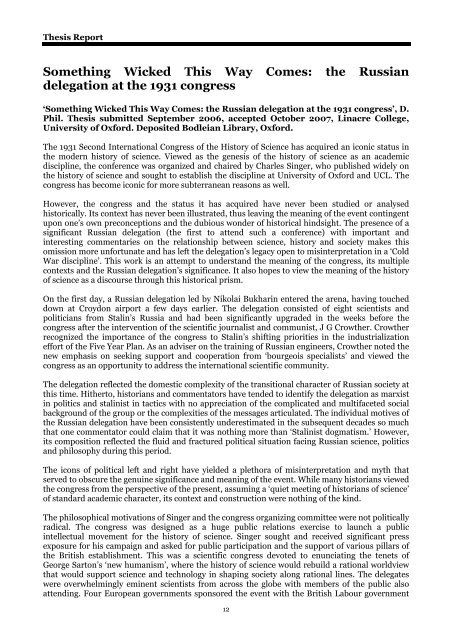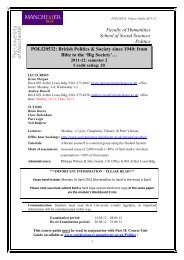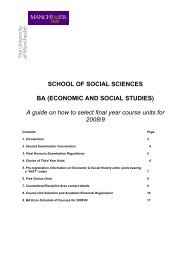CHNN 22, Spring 2008 - School of Social Sciences
CHNN 22, Spring 2008 - School of Social Sciences
CHNN 22, Spring 2008 - School of Social Sciences
Create successful ePaper yourself
Turn your PDF publications into a flip-book with our unique Google optimized e-Paper software.
Thesis Report<br />
Something Wicked This Way Comes: the Russian<br />
delegation at the 1931 congress<br />
‘Something Wicked This Way Comes: the Russian delegation at the 1931 congress’, D.<br />
Phil. Thesis submitted September 2006, accepted October 2007, Linacre College,<br />
University <strong>of</strong> Oxford. Deposited Bodleian Library, Oxford.<br />
The 1931 Second International Congress <strong>of</strong> the History <strong>of</strong> Science has acquired an iconic status in<br />
the modern history <strong>of</strong> science. Viewed as the genesis <strong>of</strong> the history <strong>of</strong> science as an academic<br />
discipline, the conference was organized and chaired by Charles Singer, who published widely on<br />
the history <strong>of</strong> science and sought to establish the discipline at University <strong>of</strong> Oxford and UCL. The<br />
congress has become iconic for more subterranean reasons as well.<br />
However, the congress and the status it has acquired have never been studied or analysed<br />
historically. Its context has never been illustrated, thus leaving the meaning <strong>of</strong> the event contingent<br />
upon one’s own preconceptions and the dubious wonder <strong>of</strong> historical hindsight. The presence <strong>of</strong> a<br />
significant Russian delegation (the first to attend such a conference) with important and<br />
interesting commentaries on the relationship between science, history and society makes this<br />
omission more unfortunate and has left the delegation’s legacy open to misinterpretation in a ‘Cold<br />
War discipline’. This work is an attempt to understand the meaning <strong>of</strong> the congress, its multiple<br />
contexts and the Russian delegation’s significance. It also hopes to view the meaning <strong>of</strong> the history<br />
<strong>of</strong> science as a discourse through this historical prism.<br />
On the first day, a Russian delegation led by Nikolai Bukharin entered the arena, having touched<br />
down at Croydon airport a few days earlier. The delegation consisted <strong>of</strong> eight scientists and<br />
politicians from Stalin’s Russia and had been significantly upgraded in the weeks before the<br />
congress after the intervention <strong>of</strong> the scientific journalist and communist, J G Crowther. Crowther<br />
recognized the importance <strong>of</strong> the congress to Stalin’s shifting priorities in the industrialization<br />
effort <strong>of</strong> the Five Year Plan. As an adviser on the training <strong>of</strong> Russian engineers, Crowther noted the<br />
new emphasis on seeking support and cooperation from ‘bourgeois specialists’ and viewed the<br />
congress as an opportunity to address the international scientific community.<br />
The delegation reflected the domestic complexity <strong>of</strong> the transitional character <strong>of</strong> Russian society at<br />
this time. Hitherto, historians and commentators have tended to identify the delegation as marxist<br />
in politics and stalinist in tactics with no appreciation <strong>of</strong> the complicated and multifaceted social<br />
background <strong>of</strong> the group or the complexities <strong>of</strong> the messages articulated. The individual motives <strong>of</strong><br />
the Russian delegation have been consistently underestimated in the subsequent decades so much<br />
that one commentator could claim that it was nothing more than ‘Stalinist dogmatism.’ However,<br />
its composition reflected the fluid and fractured political situation facing Russian science, politics<br />
and philosophy during this period.<br />
The icons <strong>of</strong> political left and right have yielded a plethora <strong>of</strong> misinterpretation and myth that<br />
served to obscure the genuine significance and meaning <strong>of</strong> the event. While many historians viewed<br />
the congress from the perspective <strong>of</strong> the present, assuming a ‘quiet meeting <strong>of</strong> historians <strong>of</strong> science’<br />
<strong>of</strong> standard academic character, its context and construction were nothing <strong>of</strong> the kind.<br />
The philosophical motivations <strong>of</strong> Singer and the congress organizing committee were not politically<br />
radical. The congress was designed as a huge public relations exercise to launch a public<br />
intellectual movement for the history <strong>of</strong> science. Singer sought and received significant press<br />
exposure for his campaign and asked for public participation and the support <strong>of</strong> various pillars <strong>of</strong><br />
the British establishment. This was a scientific congress devoted to enunciating the tenets <strong>of</strong><br />
George Sarton’s ‘new humanism’, where the history <strong>of</strong> science would rebuild a rational worldview<br />
that would support science and technology in shaping society along rational lines. The delegates<br />
were overwhelmingly eminent scientists from across the globe with members <strong>of</strong> the public also<br />
attending. Four European governments sponsored the event with the British Labour government<br />
12
















